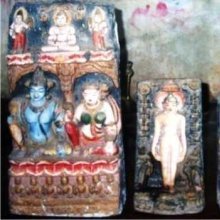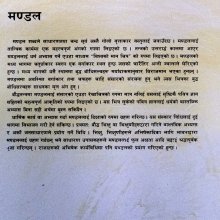Sahi: 16 definitions
Introduction:
Sahi means something in Hinduism, Sanskrit, Buddhism, Pali, the history of ancient India, Marathi, Jainism, Prakrit, Hindi, biology, Tamil. If you want to know the exact meaning, history, etymology or English translation of this term then check out the descriptions on this page. Add your comment or reference to a book if you want to contribute to this summary article.
Images (photo gallery)
In Hinduism
Kavya (poetry)
Source: OpenEdition books: Vividhatīrthakalpaḥ (Kāvya)Sāhi (साहि) in Prakrit refers to a Shah [shāh], and represents one of the Arabic-Persian words mentioned in the Vividhatīrthakalpa by Jinaprabhasūri (13th century A.D.): an ancient text devoted to various Jaina holy places (tīrthas).—var. pātasāhi: cf. sv

Kavya (काव्य, kavya) refers to Sanskrit poetry, a popular ancient Indian tradition of literature. There have been many Sanskrit poets over the ages, hailing from ancient India and beyond. This topic includes mahakavya, or ‘epic poetry’ and natya, or ‘dramatic poetry’.
India history and geography
Source: archive.org: Personal and geographical names in the Gupta inscriptionsṢāhi (षाहि) is the name of a tribe mentioned in the Gupta inscriptions. The Gupta empire (r. 3rd-century CE), founded by Śrī Gupta, covered much of ancient India and embraced the Dharmic religions such as Hinduism, Buddhism and Jainism. These tribes (e.g., the Ṣāhis, latin: Shahis) migrated to places other than their original settlemenets and gave their names to the janapadas they settled. They replaced the old Vedic tribes in Punjab and Rajasthan though some of them are deemed as offshoots of the main tribe..
Source: academia.edu: The Chronology of Ancient Gandhara and BactriaIt appears that the Hunas were the vassals of the Kushano-Sasanian kings and had only the title of “Shahi” (King) and not “Shahanushahi”(King of Kings). Inscriptions, Gilgit manuscripts and Kalhana’s Rajat arangini indicate that many Shahi kings reigned in North-western India (Kabul and Norhern Pakistan). Historians separated these Shahi kings into two categories, Patola Shahis and Kabul Shahis. But most of them had the title of “Shahi” starting from the reign of the Huna kings. Therefore, Kalhana refers to them only as Shahi kings. Therefore, it is probable that these Shahi kings belonged to the same lineage after Hunas.
Kalhana clearly records that Shahi kingdom collapsed after Trilochanapala due to invasion of Turushkas. Many princes of Shahi kingdom went to Kashmir and became the officials of Kashmir kings.
Source: Cologne Digital Sanskrit Dictionaries: Indian Epigraphical GlossarySāhi.—(IE 8-2; EI 30; LL), same as Persian Shāh, Old Persian Kshāyathiya; royal title used by some Indian rulers of foreign origin. Note: sāhi is defined in the “Indian epigraphical glossary” as it can be found on ancient inscriptions commonly written in Sanskrit, Prakrit or Dravidian languages.
See also (synonyms): Śāhī.

The history of India traces the identification of countries, villages, towns and other regions of India, as well as mythology, zoology, royal dynasties, rulers, tribes, local festivities and traditions and regional languages. Ancient India enjoyed religious freedom and encourages the path of Dharma, a concept common to Buddhism, Hinduism, and Jainism.
Biology (plants and animals)
Source: Google Books: CRC World Dictionary (Regional names)Sahi in Pakistan is the name of a plant defined with Rhazya stricta in various botanical sources. This page contains potential references in Ayurveda, modern medicine, and other folk traditions or local practices.
Example references for further research on medicinal uses or toxicity (see latin names for full list):
· Annales des Sciences Naturelles, Botanique (1835)
If you are looking for specific details regarding Sahi, for example diet and recipes, extract dosage, side effects, pregnancy safety, health benefits, chemical composition, have a look at these references.

This sections includes definitions from the five kingdoms of living things: Animals, Plants, Fungi, Protists and Monera. It will include both the official binomial nomenclature (scientific names usually in Latin) as well as regional spellings and variants.
Languages of India and abroad
Pali-English dictionary
Source: BuddhaSasana: Concise Pali-English Dictionarysahi : (aor. of sahati) bore; endured.

Pali is the language of the Tipiṭaka, which is the sacred canon of Theravāda Buddhism and contains much of the Buddha’s speech. Closeley related to Sanskrit, both languages are used interchangeably between religions.
Marathi-English dictionary
Source: DDSA: The Molesworth Marathi and English Dictionarysahī (सही).—f ( A) The same with saī in its first sense, and with saī ind.
--- OR ---
sāhī (साही).—ind (sāhā Six.) The term used in multiplying unity by six. Ex. ēkē sāhī sāhā. 2 (Poetry.) Six. Ex. kāmakrōdhādi sāhī jaṇa || adhikā- dhika mājilē ||.
Source: DDSA: The Aryabhusan school dictionary, Marathi-Englishsahī (सही).—or-
--- OR ---
sahī (सही).—f Signature.
Marathi is an Indo-European language having over 70 million native speakers people in (predominantly) Maharashtra India. Marathi, like many other Indo-Aryan languages, evolved from early forms of Prakrit, which itself is a subset of Sanskrit, one of the most ancient languages of the world.
Sanskrit dictionary
Source: Cologne Digital Sanskrit Dictionaries: Edgerton Buddhist Hybrid Sanskrit DictionarySahī (सही).—[, Lalitavistara 325.9 (verse), should be printed, sa hī (m.c. for hi): no rāgeṇa sa hī vasāmy ahaṃ na ca doṣaiḥ, Tibetan ṅa ni ḥdod chags zhe sdaṅ lhan cig gnas pa ma yin te, I (emphatic) am not dwelling with desire or hatred. I assume sa…ahaṃ = the common so 'ham of Sanskrit The only alternative would be to em. to sahā, m.c. for saha.]
Source: Cologne Digital Sanskrit Dictionaries: Benfey Sanskrit-English DictionaryŚāhi (शाहि).— m. The name of a dynasty, [Rājataraṅgiṇī] 5, 154.
Source: Cologne Digital Sanskrit Dictionaries: Monier-Williams Sanskrit-English Dictionary1) Śāhi (शाहि):—[from śāha] m. Name of a dynasty, [Rājataraṅgiṇī]
2) Sāhi (साहि):—[from sāha] a m. = [preceding] (See candra-, prema-s etc.)
3) b m. = sāha2 (See candra-, prema-, rāma-s etc.)
[Sanskrit to German]
Sanskrit, also spelled संस्कृतम् (saṃskṛtam), is an ancient language of India commonly seen as the grandmother of the Indo-European language family (even English!). Closely allied with Prakrit and Pali, Sanskrit is more exhaustive in both grammar and terms and has the most extensive collection of literature in the world, greatly surpassing its sister-languages Greek and Latin.
Hindi dictionary
Source: DDSA: A practical Hindi-English dictionary1) Śāhī (शाही):—(a) royal, regal, majestic; used as a suffix to denote a system (as [naukaraśāhī, daphtaraśāhī]); liberal.
2) Sahi (सहि):—(a) correct, right; true; accurate; authentic; hence ~[pana; -salāmata] safe and sound, hale and hearty, secure; -[sahī] correct, accurate; true; —[karanā] to sign; to endorse.
3) Sāhī (साही):—(nf) a porcupine; —[kā kāṃṭā] lit. porcupine’s thorn-supposedly causing internecine quarrels in homes where it is planted or thrown.
...
Prakrit-English dictionary
Source: DDSA: Paia-sadda-mahannavo; a comprehensive Prakrit Hindi dictionary1) Sahi (सहि) in the Prakrit language is related to the Sanskrit word: Sakhi.
2) Sahī (सही) also relates to the Sanskrit word: Sakhī.
3) Sāhi (साहि) also relates to the Sanskrit word: Śākhin.
Prakrit is an ancient language closely associated with both Pali and Sanskrit. Jain literature is often composed in this language or sub-dialects, such as the Agamas and their commentaries which are written in Ardhamagadhi and Maharashtri Prakrit. The earliest extant texts can be dated to as early as the 4th century BCE although core portions might be older.
Kannada-English dictionary
Source: Alar: Kannada-English corpusŚāhi (ಶಾಹಿ):—[noun] a succession of rulers who are members of the same family; dynasty.
--- OR ---
Ṣāhi (ಷಾಹಿ):—[noun] a succession of rulers who are members of the same family; dynasty.
--- OR ---
Sahi (ಸಹಿ):—
1) [noun] the representation of one’s name, written by oneself, as a mark of acceptance, approval, etc.; signature.
2) [noun] a thing that has actually is or happened; the fact.
3) [noun] ಸಹಿಮಾಡು [sahimadu] sahi māḍu to sign on something (as a letter, agreeement, application, etc. as a mark of one’s consent, approval, etc.); 2. to prove something to be true; ಸಹಿಹಾಕು [sahihaku] sahi hāku = ಸಹಿಮಾಡು - [sahimadu -] 1.
Kannada is a Dravidian language (as opposed to the Indo-European language family) mainly spoken in the southwestern region of India.
Tamil dictionary
Source: DDSA: University of Madras: Tamil LexiconSahi (ஸஹி) [sahittal] 11 transitive verb < sah. See சகி-. [sagi-.]
--- OR ---
Sahi (ஸஹி) noun < Arabic sahih. Truth; correctness; உண்மை. [unmai.]
Tamil is an ancient language of India from the Dravidian family spoken by roughly 250 million people mainly in southern India and Sri Lanka.
See also (Relevant definitions)
Starts with (+142): Cahinakal, Cahip, Saahitiyik-bhashaa, Sahi-arthama, Sahi-garnu, Sahi-kari, Sahi-manema, Sahi-salamata, Sahi-thapai, Sahi-thapnu, Sahia, Sahia, Sahia, Sahia, Sahiava, Sahib, Sahib Kaul, Sahiba, Sahibram, Sahichapa.
Ends with (+43): Adhikarashahi, Ahutishahi, Amosahi, Anutsahi, Atyutsahi, Babwi sahi, Badashahi, Balusahi, Bamdavalashahi, Bamdavalushahi, Bebamdashahi, Bhamdavalashahi, Bhimasahi, Bhupalasahi, Candrasahi, Dadapashahi, Damasahi, Daphtarshahi, Gopalasahi, Hridayasahi.
Full-text (+44): Shakhin, Premasahi, Sahisuja, Shahi, Huna, Shahimakaranda, Sahideva, Shahi jira, Babwi sahi, Turushka, Madhukarasaha, Ahutishahi, Cahinakal, Ramasahi, Simhasahi, Piroja, Piyaroja, Sahi-kari, Sahivici, Candrasahi.
Relevant text
Search found 14 books and stories containing Sahi, Śāhī, Shahi, Sāhī, Sāhi, Sahī, Śāhi, Śahi, Ṣāhi, Ṣahi; (plurals include: Sahis, Śāhīs, Shahis, Sāhīs, Sāhis, Sahīs, Śāhis, Śahis, Ṣāhis, Ṣahis). You can also click to the full overview containing English textual excerpts. Below are direct links for the most relevant articles:
Telugu Literature under Kutub Shahis < [April-June 1942]
Who’s Who Among our Contributors < [April – June, 2001]
Nationalism in Telugu Poetry < [October 1955]
Jainism in Odisha (Orissa) (by Ashis Ranjan Sahoo)
Risabhanatha image at Subarnesvara Temple, Dhia Sahi, Sahada < [Chapter 3: Survey of Jaina Antiquities in Odisha]
Jaina Antiquities in Choudwar (Cuttack) < [Chapter 3: Survey of Jaina Antiquities in Odisha]
Jaina Antiquities in Shergarh (Balasore) < [Chapter 3: Survey of Jaina Antiquities in Odisha]
Folk Tales of Gujarat (and Jhaverchand Meghani) (by Vandana P. Soni)
Chapter 8 - Vismada! Visamda! < [Part 3 - Kankavati]
Chaitanya Bhagavata (by Bhumipati Dāsa)
Verse 2.10.121 < [Chapter 10 - Conclusion of the Lord’s Mahā-prakāśa Pastimes]
Verse 2.17.73 < [Chapter 17 - The Lord’s Wandering Throughout Navadvīpa and Descriptions of the Devotees’ Glories]
Verse 2.26.108-117 < [Chapter 26 - Descriptions of the Mercy Bestowed on Śuklāmbara and Vijay and the Lord’s Desire to Accept Sannyāsa]
Rig Veda (translation and commentary) (by H. H. Wilson)
Rig Veda 4.11.2 < [Sukta 11]
Matangalila and Hastyayurveda (study) (by Chandrima Das)
Related products




